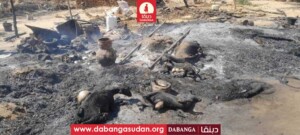UNHCR repatriation of Sudanese refugees from Chad to resume
The tripartite committee of the Sudanese and Chadian governments with the United Nations’ refugee agency (UNHCR) has decided to resume the voluntary repatriation of Sudanese refugees from Chad.
 A convoy with refugees returning to Darfur from camps in eastern Chad, June 2018 (UNHCR)
A convoy with refugees returning to Darfur from camps in eastern Chad, June 2018 (UNHCR)
The tripartite committee of the Sudanese and Chadian governments with the United Nations’ refugee agency (UNHCR) has decided to resume the voluntary repatriation of Sudanese refugees from Chad by November, and the voluntary return of Chadian refugees from Sudan in December.
At the conclusion of a three-day meeting in the Chadian capital N'Djamena on Sunday, the committee also decided to arrange a conference to timely gather financial support for voluntary repatriation operations in accordance with the peace agreement from 2011, the Doha Document for Peace in Darfur (DDPD).
The Commissioner for Voluntary Return and Reconstruction in Darfur, Tajeldin Ibrahim El Tahir, told Sudanese media that the meetings discussed the progress so far in the return of Chadian and Sudanese refugees.
The parties also looked into the activities of the Sudanese government in the camps in eastern Chad, and exchanged information about their impact on the implementation of the tripartite agreement on voluntary repatriation.
Situation on the ground
The “most important challenges” under discussion were the creation of strong mechanisms for the exchange of information on the situation on the ground, as well as logistical difficulties caused by rain, road closures and lack of funding.
El Tahir said that the Sudanese delegation held a presentation on the measures taken by Khartoum to address security issues, voluntary repatriation, provision of basic services, livelihood and distribution of food and shelter materials in the region.
Tension over land
Commissions would be established to settle land disputes, according to the delegation. Tension over land has earlier caused dozens of displaced families to return once again to camps in North Darfur in May, after mediation attempts with new settlers in their home villages failed. Some of them had traveled all the way from refugee camps in eastern Chad.
The UNHCR confirmed in a response to Radio Dabanga at the time that the agency was informed about a disagreement over land in the return area of Sabarna, Kabkabiya.
The first large-scale voluntary returns from Chad took place in April, when the UNHCR and the Commissioner of Refugees (COR) assisted dozens of Sudanese refugees from Chad in their return to Kabkabiya, Saraf Omra and Karnoi. UNHCR said that the Sudanese returnees were assisted with a reintegration package and transportation from the reception centre in Tina to their home villages in North Darfur.
A spokesman told Radio Dabanga at the time that “under the agreement, the Goverment of Sudan has made assurances that refugees will have access to land and will return in conditions of safety and dignity. UNHCR is also given access to monitor the situation of returnees to ensure their treatment is in line with international humanitarian and human rights standards.”
300,000+ refugees
Chad, Sudan and the UNHCR signed an agreement in May 2017 by the governments of Sudan and Chad and UNHCR for the voluntary repatriation of 20,000 Sudanese refugees from Chad this year. In May 2017, the UN High Commission for Refugees (UNHCR) reported that 317,219 Darfuri refugees reside in twelve camps in eastern Chad. On 31 July, the United Nations’ Children’s Fund (Unicef) said there are 319,512 Sudanese refugees residing in the camps since 2003.
The refugees in Chad suffer from a shortage of supplies of basic commodities such as sugar and cooking oil, a camp sheikh reported to Radio Dabanga in March this year.











 and then
and then